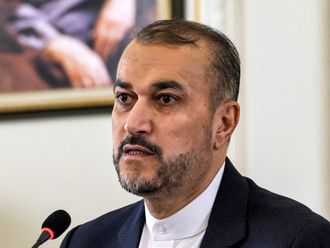Cairo: Egypt’s interim government delayed using force to break up Islamist sit-ins to intensify pressure on the Muslim Brotherhood and to avoid international blame for a potentially large number of victims, experts say.
Millions of Egyptians who rallied across the country on July 26 to grant the armed forces a mandate to confront “violence and terrorism”, widely seen as a reference to ousted President Mohammad Mursi’s supporters, were eager to see a break up of Islamists sit-ins at Rabaa Al Adawaya mosque and Al Nahda Square taking place immediately.
Interior Minister Mohammad Ebrahim has warned a week before that the month-long Brotherhood sit-ins will be dealt with “very soon”, adding that “the anti-riots forces are in complete coordination with the army. The Brotherhood leaders would be arrested in the process”.
Military spokesman Colonel Ahmad Ali, however, asserted army has not set a deadline for dispersing the pro-Mursi demonstrations.
“There has been a misunderstanding that the [pro-Mursi] vigils would be dispersed a day later,” Ali added.
Ali was responding to speculation, which has grown in recent days, that the sit-ins would be dispersed soon after the Egyptian cabinet on Wednesday announced it had authorised the interior ministry to end the protests.
He went on to say that the pro-Mursi vigils had “departed from the peaceful context” and shown a “tendency towards violence”, citing deadly clashes with security and army officers at marches and rallies in which weapons were used “leaving deaths on both sides.”
However Ali said that “the matter requires a lot of evaluation and calculations. This does not mean a retreat or [having been put under] pressure.”
But military statements didn’t clear the situation, which became surprising or puzzling in the eyes of many Egyptians.
An informed source in Egypt’s cabinet told Gulf News that foreign ministry recommended the interim Prime Minister Hazem Al Beblawi to postpone the dispersion using force and to give a last chance for local, regional or international diplomatic efforts to resolve the crisis without losses.
The Premier fears that the interim government’s recent success in convincing international institutions and foreign countries to consider the political change promoted by mass rallies on June 30 as “an expression of the will of the people and not a military coup” could be deteriorated if the possible break up results in a new bloodshed, the source added.
Sa’ad Al Deen Ebrahim, the leading democracy activist and chairman of Ibn Khaldun Centre for Democratic Studies, retreated from his prediction that the sit-ins would be dismantled by force before Eid Al Fitr.
“The delay is due to the security authorities desire to avoid bloodshed. They think that time is to put a lot of pressure on the protesters by increasing people’s irritation over Brotherhood practices,” Ebrahim told Gulf News.
He added that the security forces’ had resorted to psychological warfare against pro-Mursi protesters. They wanted to mobilise masses of Egyptians who want to break up the sit-ins behind them.
Ebrahim said that the Interior Ministry and armed forces would bear in mind that a huge number of foreign correspondents were present in Rabaa Al Adawya and Al Nahda squares.
Also there are many foreign political and human rights delegations visiting the sit-ins. The security authorities recognised that using force would increase public and international sympathy for the Brotherhood, he said. So they want to implement the best scenario through which they could break up the sit-ins without spilling a single drop of blood.
“Egypt’s interim government found itself in a difficult and confusing situation. The political and humanitarian cost of using force to break up the sit-ins may be prohibitive and nobody was prepared to take responsibility of it. On other hand, the delay could be seen as a sign of hesitation on an issue concerning the safety of the state and its national security and nobody was resting for the repercussions of such a decision,” according Abdullah Al Sennawi, a columnist known to be close to the military.
“International, American and Arab delegations pouring into Cairo to play a role in ending Islamists sit-ins without bloodshed have likely delayed the government decision to use force,” Al Sennawi explained adding that “seemingly, the United States asked Gulf states ministers to come forward at this moment to prevent possible clashes that could lead to a final exit of the Brotherhood from the political scene for years to come”.
Al Sennawi referred to Defence Minister Abdul Fattah Al Sissi’s statement in his interview with Washington Post as saying that “the US administration has a lot of leverage and influence with the Muslim Brotherhood, and I’d really like the US administration to use this leverage with them to resolve the conflict.”
Al Sennawi concluded that “the military leadership delayed dispersing the sit-ins by force in an attempt to use the US and Arab meditation to intensify pressure on the Brotherhood. And when the mediations fail no one would have the right to blame the government for its coming final decision”.
— The writer is a journalist based in Cairo












